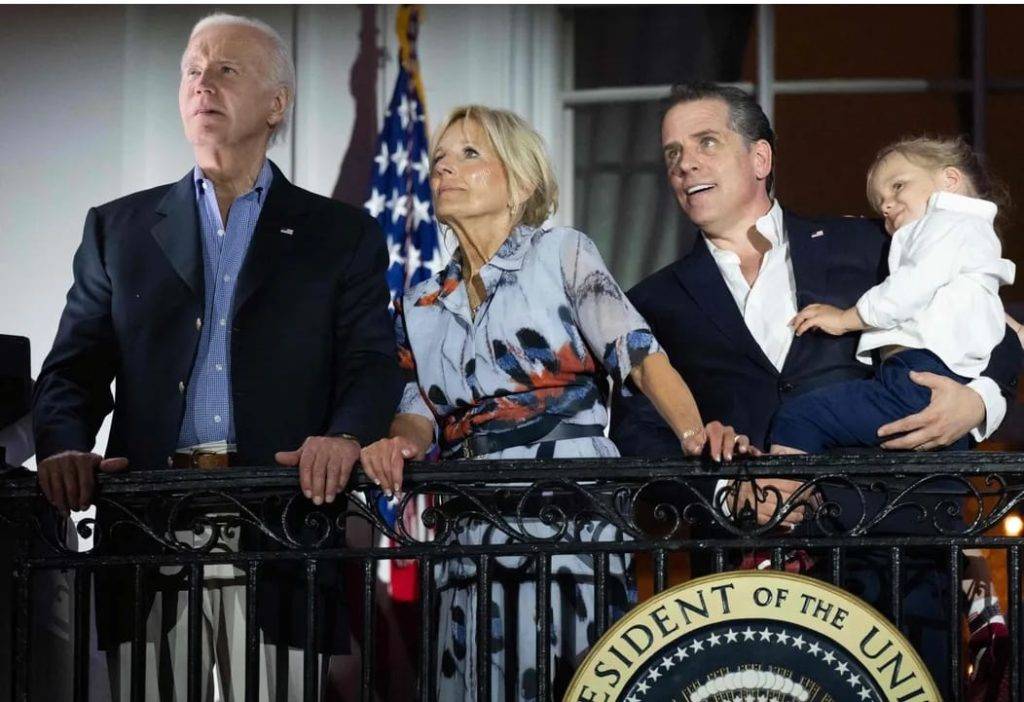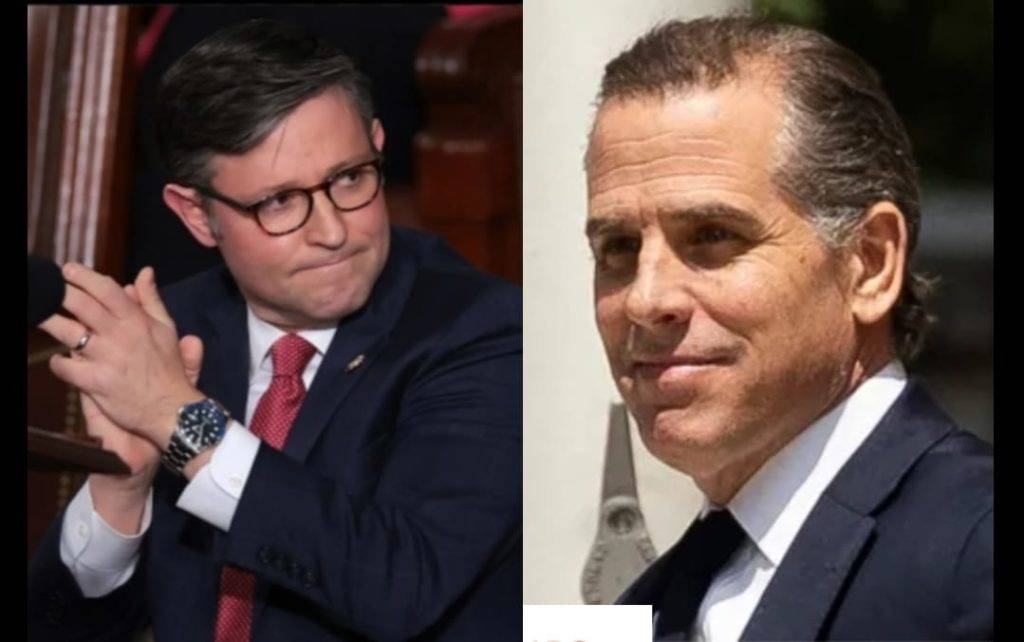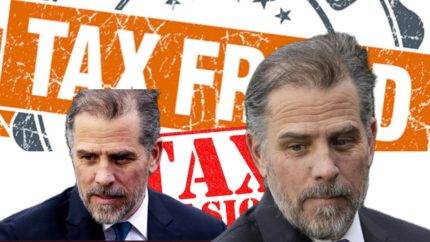Hunter Biden, the son of President Joe Biden, has been indicted on nine tax charges in California, marking a crucial juncture in the ongoing special counsel investigation into his business dealings. This development comes against the backdrop of the looming 2024 election and intensifies the scrutiny on the President’s family.
The charges, filed on Thursday, comprise three felonies and six misdemeanors, adding to the federal firearms charges in Delaware that allege Hunter Biden violated laws against drug users possessing guns in 2018. The collapse of a plea deal over the summer has shifted the trajectory of the case towards a potential trial, raising the stakes as President Biden campaigns for reelection.
Special counsel David Weiss emphasized that Hunter Biden had “spent millions of dollars on an extravagant lifestyle rather than paying his tax bills.” The charges specifically revolve around at least $1.4 million in unpaid taxes during the period from 2016 to 2019. Notably, this span coincided with Hunter Biden’s public struggles with addiction, a detail that adds complexity to the case.
Although the back taxes have since been settled, the potential consequences are severe. If convicted, the 53-year-old Hunter Biden could face a maximum of 17 years in prison. The special counsel investigation remains ongoing, keeping the legal challenges surrounding the President’s son in the spotlight.
Hunter’s Lawyer Accuses Special Counsel of Bowing to Political Pressure
The indictment has triggered a fiery response from Hunter Biden’s defense attorney, Abbe Lowell, who accused special counsel David Weiss of succumbing to political pressure from Republicans. In a statement, Lowell asserted that if Hunter’s last name were anything other than Biden, the charges in Delaware and California would not have been brought forward. This claim raises questions about the potential politicization of the case and injects a partisan element into the legal proceedings.
The White House, in response to the recent indictment, opted not to comment, redirecting inquiries to the Justice Department or Hunter Biden’s personal representatives. This decision hints at the sensitivity and political implications surrounding the case, considering President Biden’s bid for reelection.

As the legal battle unfolds, the public will closely watch how these developments impact the broader political landscape and the ongoing debate over the intersection of legal accountability, family ties, and partisan influence in high-profile cases. The stakes are high, both for Hunter Biden personally and for the political climate as the 2024 election looms on the horizon.
Hunter’s Lavish Spending Habits Detailed in Indictment
The recently filed charging documents in California shed light on the extravagant lifestyle of Hunter Biden, detailing expenditures on drugs, strippers, luxury hotels, and exotic cars. Prosecutor Leo Wise remarked, “in short, everything but his taxes.” This revelation adds a sensational layer to the tax charges Hunter Biden is facing, portraying a stark contrast between his lavish personal spending and alleged negligence in fulfilling his tax obligations. The detailed accounts of his expenditures are likely to be closely scrutinized as the legal proceedings unfold, potentially influencing public perception of the case.
The indictment arrives amid an already charged political atmosphere, with congressional Republicans pursuing an impeachment inquiry into President Biden. They claim the President was involved in an influence-peddling scheme with his son. The House is set to vote on formally authorizing the inquiry next week. While the charging documents focus on Hunter Biden’s financial dealings, the political implications of the case are substantial. The intersection of legal scrutiny, political maneuvers, and public perception creates a complex narrative that will undoubtedly impact both legal proceedings and the broader political landscape.
Hunter Biden’s Shared Personal Struggles With Drug
Hunter Biden did not hide his struggles with drug use and shortcomings with wayward lifestyle. His memoir unveils a candid and intimate account of his struggles with addiction, prominently featuring an episode where Dr. Jill Biden orchestrates a family intervention at their home in Wilmington, Delaware. The poignant scene, vividly depicted in the memoir, unfolds with the family gathered alongside counselors from various rehab facilities—a testament to the recurring nature of Hunter’s battle with addiction. Future President Joe Biden is portrayed as terrified and pleading with his son, underscoring the emotional toll on the Biden family. The narrative captures the desperation and determination of Hunter’s loved ones as they attempt to guide him toward recovery.
The memoir sheds light on the tumultuous relationship between Hunter and his late brother, Beau Biden, the former Attorney General of Delaware. While Hunter refrains from blaming Beau for his struggles, the timeline of his addiction aligns with Beau’s untimely death at 46. Despite the raw and unfiltered portrayal of Hunter’s journey through rehab, relapses, and personal turmoil, the underlying theme of the narrative is one of redemption. The fact that Hunter Biden survived the depths of addiction to share his story becomes a powerful testament to resilience, providing readers with a glimpse into the personal battles that have shaped his life.
Hunter Biden’s memoir not only delves into the harrowing details of addiction but also paints a vivid picture of redemption. The narrative unfolds with countless rehab visits, searches for drugs in Nashville, and a 14-day bender marked by car accidents and misplaced items. The memoir takes readers on a journey as Hunter learns to cook crack at Chateau Marmont and recounts chasing a hallucinated barn owl through the California desert. The stark honesty with which he confronts what he terms “the Four Horsemen of the Crackocalypse” provides a raw and unfiltered perspective on his battles.

Impeachment Inquiry and Political Fallout
The backdrop of the ongoing congressional impeachment inquiry into President Biden adds a layer of complexity to Hunter Biden’s legal troubles. Although no evidence has surfaced to substantiate claims of Joe Biden abusing his office or accepting bribes, the ethical questions surrounding the Biden family’s international business dealings linger. The long-running criminal investigation into Hunter Biden, initially expected to conclude with a plea deal, has taken a different turn with the recent indictment, exposing the tumultuous nature of the legal proceedings.
The proposed plea deal, which would have granted Hunter Biden two years’ probation after pleading guilty to misdemeanor tax charges, faced criticism from Republicans, branding it a “sweetheart deal.” Former President Donald Trump, amidst his own legal battles, including charges related to attempting to overturn the 2020 election results, voiced his disapproval. The new charges are attributed by Rep. James Comer, R-Ky., to two IRS investigators who claimed the Justice Department mishandled and “slow walked” the investigation into the President’s son. Despite denials from Justice officials, the case remains a focal point for political discourse, raising questions about the intersection of legal processes and partisan motivations.
Tax Charges Amidst Legal Battle
The latest developments in the legal saga surrounding Hunter Biden involve two IRS employees, Gary Shapley and Joseph Ziegler, expressing their belief that the indictment is a “complete vindication” of their thorough investigation. The new charges against Hunter Biden include serious felonies such as filing a false return and tax evasion, along with misdemeanor charges for failure to file and failure to pay taxes. This marks a significant escalation in the legal proceedings against the President’s son, adding complexity to an already convoluted case.
The defense team has indicated its intention to contest the new charges, likely relying on immunity provisions from the original plea deal. The defense argues that these provisions remain valid, as they were signed by a prosecutor before the plea deal was abandoned. However, prosecutors assert that the documents lack the necessary judicial signature, rendering them invalid. Additionally, the defense plans to challenge the federal gun charges, deeming them “unprecedented and unconstitutional.” These charges allege that Hunter Biden lied about his drug use to purchase a gun in 2018, a case that has raised questions about the applicability and constitutionality of federal laws regarding gun possession by habitual drug users.
Hunter Biden’s Complex Financial & Legal Landscape
Hunter Biden’s legal troubles extend beyond tax evasion, delving into federal gun charges that stem from allegations of providing false information about his drug use when acquiring a firearm in 2018. Federal law prohibits gun possession by habitual drug users, but the rarity of standalone charges under this provision raises legal questions, especially when challenged by a federal appeals court. Hunter Biden’s long-standing struggle with substance abuse, exacerbated by the death of his brother Beau Biden in 2015, has been well-documented in court records and his memoir “Beautiful Things.”
Despite his personal challenges, Hunter Biden’s financial activities have come under scrutiny, with prosecutors highlighting his substantial gross income of approximately $7 million between 2016 and 2020. This income is attributed to his roles on the board of the Ukrainian energy company Burisma, a Chinese private equity fund, and a position at a law firm. The complexity of the case is further compounded by the fact that Hunter filed his taxes in 2020, with the back taxes reportedly paid by a third party during a child support case in Arkansas. As the legal battle intensifies, the intricacies of Hunter Biden’s financial dealings and legal maneuvering continue to unfold, shaping a narrative that encompasses issues ranging from tax evasion to the constitutional implications of federal gun charges.
Table of Contents
Discover more from OGM News NG
Subscribe to get the latest posts sent to your email.














